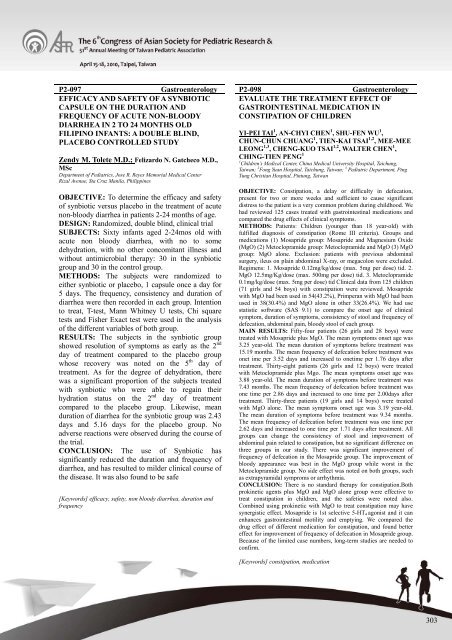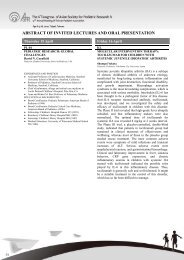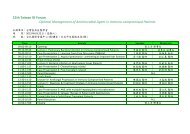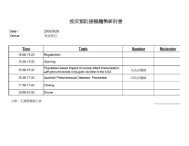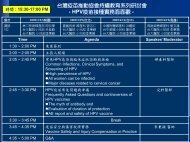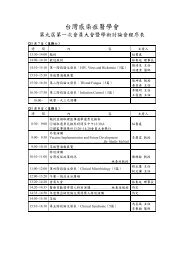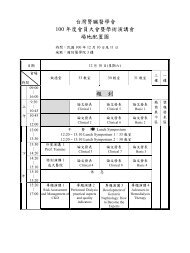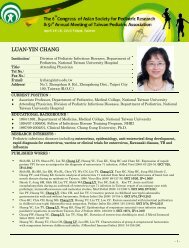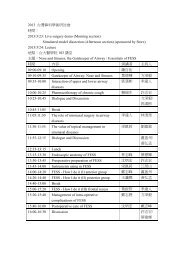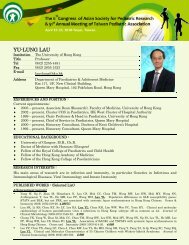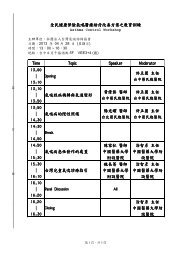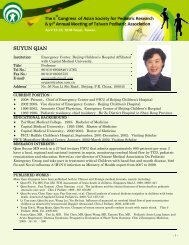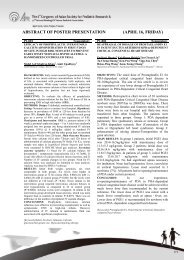ABSTRACT OF POSTER PRESENTATION (APRIL 17, SATURDAY)
ABSTRACT OF POSTER PRESENTATION (APRIL 17, SATURDAY)
ABSTRACT OF POSTER PRESENTATION (APRIL 17, SATURDAY)
Create successful ePaper yourself
Turn your PDF publications into a flip-book with our unique Google optimized e-Paper software.
P2-097 Gastroenterology P2-098 GastroenterologyEFFICACY AND SAFETY <strong>OF</strong> A SYNBIOTICCAPSULE ON THE DURATION ANDFREQUENCY <strong>OF</strong> ACUTE NON-BLOODYEVALUATE THE TREATMENT EFFECT <strong>OF</strong>GASTROINTESTINAL MEDICATION INCONSTIPATION <strong>OF</strong> CHILDRENDIARRHEA IN 2 TO 24 MONTHS OLDFILIPINO INFANTS: A DOUBLE BLIND,PLACEBO CONTROLLED STUDYZendy M. Tolete M.D.; Felizardo N. Gatcheco M.D.,MScDepartment of Pediatrics, Jose R. Reyes Memorial Medical CenterRizal Avenue, Sta Cruz Manila, PhilippinesOBJECTIVE: To determine the efficacy and safetyof synbiotic versus placebo in the treatment of acutenon-bloody diarrhea in patients 2-24 months of age.DESIGN: Randomized, double blind, clinical trialSUBJECTS: Sixty infants aged 2-24mos old withacute non bloody diarrhea, with no to somedehydration, with no other concomitant illness andwithout antimicrobial therapy: 30 in the synbioticgroup and 30 in the control group.METHODS: The subjects were randomized toeither synbiotic or placebo, 1 capsule once a day for5 days. The frequency, consistency and duration ofdiarrhea were then recorded in each group. Intentionto treat, T-test, Mann Whitney U tests, Chi squaretests and Fisher Exact test were used in the analysisof the different variables of both group.RESULTS: The subjects in the synbiotic groupshowed resolution of symptoms as early as the 2 ndday of treatment compared to the placebo groupwhose recovery was noted on the 5 th day oftreatment. As for the degree of dehydration, therewas a significant proportion of the subjects treatedwith synbiotic who were able to regain theirhydration status on the 2 nd day of treatmentcompared to the placebo group. Likewise, meanduration of diarrhea for the synbiotic group was 2.43days and 5.16 days for the placebo group. Noadverse reactions were observed during the course ofthe trial.CONCLUSION: The use of Synbiotic hassignificantly reduced the duration and frequency ofdiarrhea, and has resulted to milder clinical course ofthe disease. It was also found to be safe[Keywords] efficacy, safety, non bloody diarrhea, duration andfrequencyYI-PEI TAI 1 , AN-CHYI CHEN 1 , SHU-FEN WU 1 ,CHUN-CHUN CHUANG 1 , TIEN-KAI TSAI 1,2 , MEE-MEELEONG 1,3 , CHENG-KUO TSAI 1,2 , WALTER CHEN 1 ,CHING-TIEN PENG 11 Children’s Medical Center, China Medical University Hospital, Taichung,Taiwan; 2 Fong Yuan Hospital, Taichung, Taiwan; 3 Pediatric Department, PingTung Christian Hospital, Pintung, TaiwanOBJECTIVE: Constipation, a delay or difficulty in defecation,present for two or more weeks and sufficient to cause significantdistress to the patient is a very common problem during childhood. Wehad reviewed 125 cases treated with gastrointestinal medications andcompared the drug effects of clinical symptoms.METHODS: Patients: Children (younger than 18 year-old) withfulfilled diagnosis of constipation (Rome III criteria). Groups andmedications (1) Mosapride group: Mosapride and Magnesium Oxide(MgO) (2) Metoclopramide group: Metoclopramide and MgO (3) MgOgroup: MgO alone. Exclusion: patients with previous abdominalsurgery, ileus on plain abdominal X-ray, or megacolon were excluded.Regimens: 1. Mosapride 0.12mg/kg/dose (max. 5mg per dose) tid. 2.MgO 12.5mg/Kg/dose (max. 500mg per dose) tid. 3. Metoclopramide0.1mg/kg/dose (max. 5mg per dose) tid Clinical data from 125 children(71 girls and 54 boys) with constipation were reviewed. Mosapridewith MgO had been used in 54(43.2%), Primperan with MgO had beenused in 38(30.4%) and MgO alone in other 33(26.4%). We had usestatistic software (SAS 9.1) to compare the onset age of clinicalsymptom, duration of symptoms, consistency of stool and frequency ofdefecation, abdominal pain, bloody stool of each group.MAIN RESULTS: Fifty-four patients (26 girls and 28 boys) weretreated with Mosapride plus MgO. The mean symptoms onset age was3.25 year-old. The mean duration of symptoms before treatment was15.19 months. The mean frequency of defecation before treatment wasonet ime per 3.52 days and increased to onetime per 1.76 days aftertreatment. Thirty-eight patients (26 girls and 12 boys) were treatedwith Metoclopramide plus Mgo. The mean symptoms onset age was3.88 year-old. The mean duration of symptoms before treatment was7.43 months. The mean frequency of defecation before treatment wasone time per 2.86 days and increased to one time per 2.00days aftertreatment. Thirty-three patients (19 girls and 14 boys) were treatedwith MgO alone. The mean symptoms onset age was 3.19 year-old.The mean duration of symptoms before treatment was 9.34 months.The mean frequency of defecation before treatment was one time per2.62 days and increased to one time per 1.71 days after treatment. Allgroups can change the consistency of stool and improvement ofabdominal pain related to constipation, but no significant difference onthree groups in our study. There was significant improvement offrequency of defecation in the Mosapride group. The improvement ofbloody appearance was best in the MgO group while worst in theMetoclopramide group. No side effect was noted on both groups, suchas extrapyramidal symproms or arrhythmia.CONCLUSION: There is no standard therapy for constipation.Bothprokinetic agents plus MgO and MgO alone group were effective totreat constipation in children, and the safeties were noted also.Combined using prokinetic with MgO to treat constipation may havesynergistic effect. Mosapride is 1st selective 5-HT 4 agonist and it canenhances gastrointestinal motility and emptying. We compared thedrug effect of different medication for constipation, and found bettereffect for improvement of frequency of defecation in Mosapride group.Because of the limited case numbers, long-term studies are needed toconfirm.[Keywords] constipation, medication303


